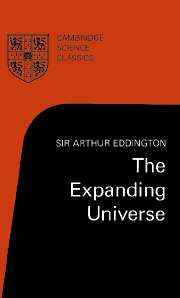Foreword by Sir William McCrea
Published online by Cambridge University Press: 15 December 2009
Summary
Sir arthur (stanley) eddington om, frs (1882–1944), pioneer of stellar dynamics, tester and expounder of general relativity theory, father of modern theoretical astrophysics, explorer of the foundations of physics, was one of the greatest and most influential scientists of this century.
He had long been fascinated by questions about the constants of physics, the significance of large dimensionless numbers given by certain combinations of these, and their possible association with large-scale properties of the astronomical universe (e.g. The Mathematical Theory of Relativity (1923), page 167). Then about 1930 he rather stumbled upon a possible relation between these quantities and the rate of expansion of the Universe. When he wrote this in what seemed to be its simplest form, it yielded very closely the empirical rate that E.P. Hubble had just claimed to have discovered. At the same time, Eddington was seeking some ‘meeting’ of relativity and quantum theory. He claimed to see a connection with the foregoing relation such that, with minimal elaboration, it served to yield a theoretical prediction of the masses of the proton and electron. He was engaged in a highly sophisticated development of all this, which in due course resulted in the monumental monographs Relativity Theory of Protons and Electrons (1936) and Fundamental Theory (1946). Clever as these are in exposing fundamental problems for the whole of physics, no one has ever claimed to be convinced of the validity of the solutions they offer. No one, that is, except Eddington.
- Type
- Chapter
- Information
- The Expanding UniverseAstronomy's 'Great Debate', 1900–1931, pp. xi - xxivPublisher: Cambridge University PressPrint publication year: 1920



